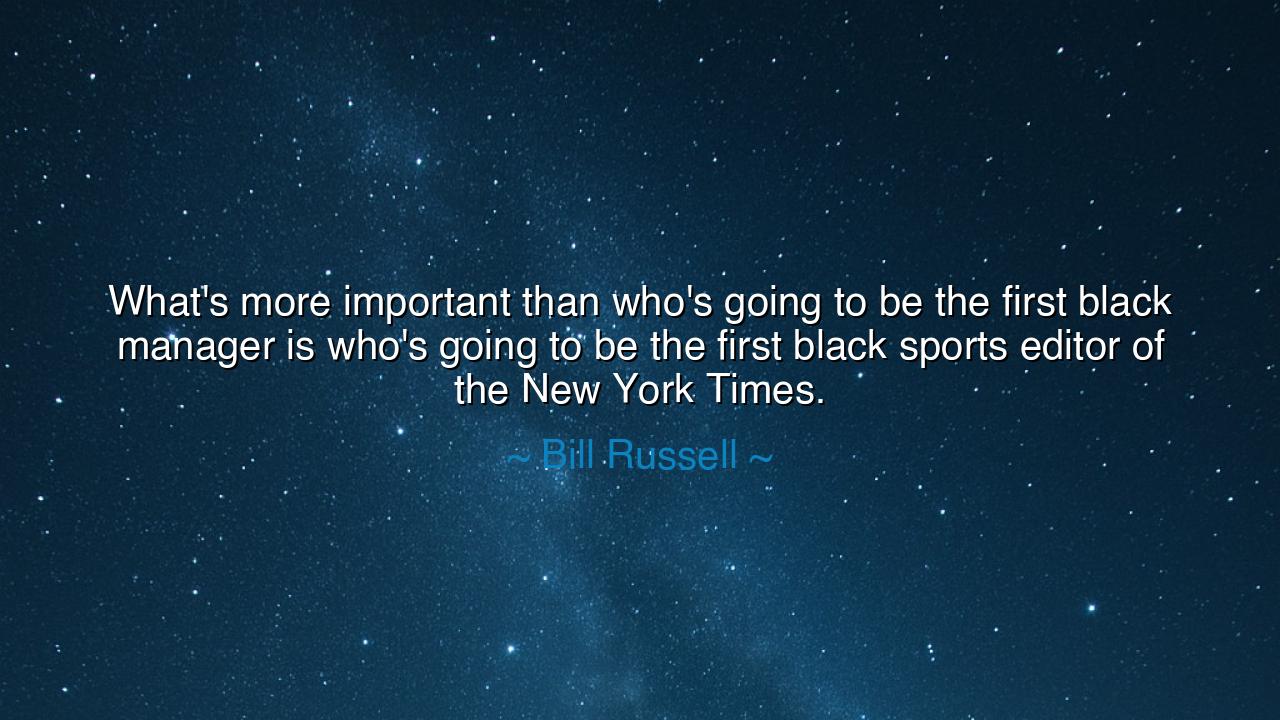
What's more important than who's going to be the first black
What's more important than who's going to be the first black manager is who's going to be the first black sports editor of the New York Times.






The words of Bill Russell—“What’s more important than who’s going to be the first black manager is who’s going to be the first black sports editor of the New York Times”—strike with the force of prophecy. Russell, the warrior of the court, a man crowned with championships and burdened with struggles, spoke not merely of sports but of power, perception, and the shaping of narratives. He understood that victories on the field and in the arena matter, but even more, the voices that tell the story of those victories shape history itself. For what is an achievement if it is not remembered, and who controls remembrance if not the storyteller?
In this quote, Russell points us to the deeper truth that representation in leadership is not enough if the power to frame, to define, and to judge remains untouched. A manager may lead a team, but the editor decides how the world will view that team, how the story will be told, whose triumphs will be celebrated, and whose struggles will be silenced. The ancients knew this as well: the generals fought the battles, but it was the scribes who carved the chronicles, who gave names to victories and defeats. Thus, Russell’s wisdom warns us: do not only seek seats on the battlefield of action—seek also the thrones of influence where stories are immortalized.
Consider the history of Jackie Robinson, the first black player in Major League Baseball. His courage on the diamond broke barriers, yet much of how he was remembered—hero or villain, trailblazer or troublemaker—depended on the pens of the journalists who wrote his story. Some sought to diminish him, others to uplift him, but the truth remains: the editor wields a power equal to the athlete, for both shape the future, one with action, the other with words. Russell knew that until black voices held the quill, the narrative of black achievement would always risk distortion.
The emotional power of this teaching lies in its depth: it calls us not only to fight for presence in visible places but also in hidden chambers where influence is forged. To become the first black manager was progress, yes, but to become the first black editor of the New York Times sports desk would be revolution. For in that role, a person does not just manage a game—they manage truth, perspective, and legacy. Russell’s insight was a plea to aim higher, to see further, and to grasp not only the prize of participation but also the throne of interpretation.
The ancients provide us parallels. In Athens, the orators held sway equal to the generals, for their words could rouse citizens to war or peace. In Rome, the historians like Livy and Tacitus shaped how posterity remembered emperors and senators. Without these voices, even mighty deeds would crumble into silence. And so it is in modern times: the athlete plays, but the journalist preserves—or distorts—the meaning of the play. Russell teaches that freedom is incomplete until one can also master the pen.
For the seeker of wisdom, the lesson is clear: do not be content merely to break one barrier. Look beyond the obvious victories, to the places of hidden power. Ask yourself: who writes the story of my struggle? Who defines the meaning of my achievements? And then strive not only to win battles, but to sit at the tables where history is recorded. True equality is not merely in the field of action, but in the chambers where narratives are woven.
What then must we do? We must encourage not only players and coaches, but also writers, editors, teachers, and historians. We must raise up voices that have long been silenced, ensuring that they are not merely participants in the story, but authors of it. Seek not only to be remembered, but to hold the pen that remembers. For in doing so, you do not only shape your own destiny—you shape the destiny of generations yet unborn.
Thus, Bill Russell’s words stand as a commandment: strive not only for the visible crown, but also for the hidden scepter of influence. For it is not enough to win the game; one must also ensure the game is truthfully told. In this lies the deeper victory, the victory that endures not for a season, but for eternity.






AAdministratorAdministrator
Welcome, honored guests. Please leave a comment, we will respond soon